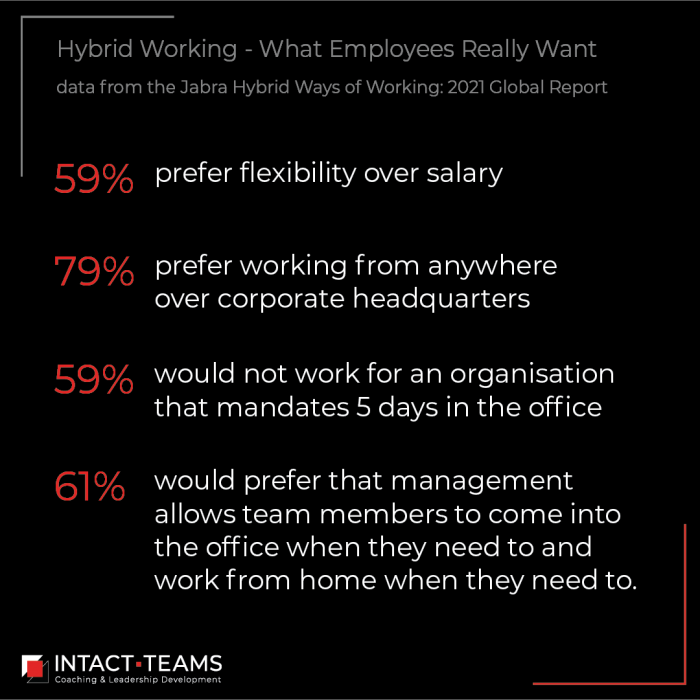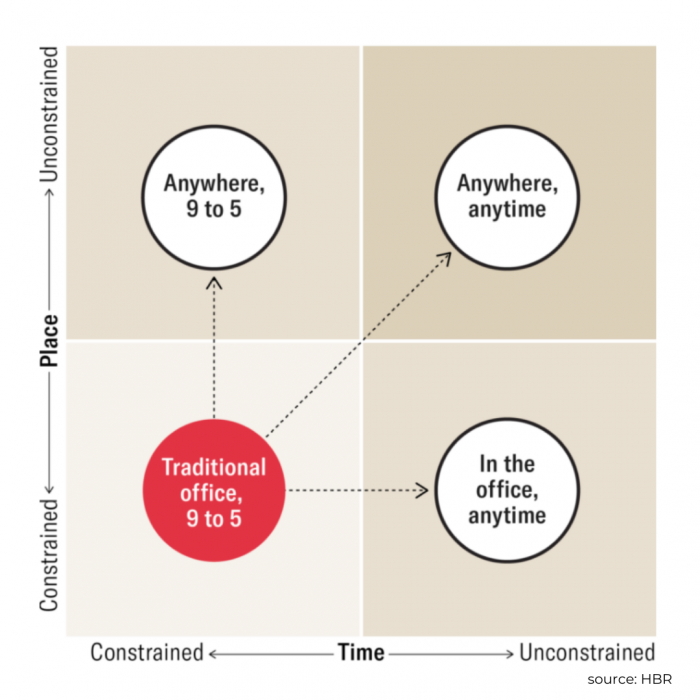As we start returning to our offices, organisations are creating new workplace structures that fit the bill of hybrid working. We have been saying that employees are asking for flexibility to work from home, remotely or a bit of both. But what people are actually asking for is flexibility by way of autonomy.
A recent employee survey confirms our thoughts:

In the same survey, 61% of employees report that they would prefer if management allowed team members to come into the office when they need to and work from home when they need to. So, the data shows that the flexibility they want is conditional upon their ability to exercise it in a way that best fits them. In other words, it’s conditional upon autonomy.’
I have been helping a client here in Melbourne to structure their ‘return to the office’ plan in a quest to offer flexibility that works for employees and also meets organisational goals and expectations. Instead of mandating for staff to come in on certain days, they are now communicating that team members can chose when to work from the office and from home. They can choose as long as projects get delivered, and both face-to-face collaboration and client meetings are in place. The conversations the executive team carefully designed are around balancing expectations and autonomy. Flexibility in way of autonomy works.
Why is autonomy important for people?
Autonomy means having decision making power. According to David Rock from the Neuro Leadership Institute, autonomy is one of the most important intrinsic drivers of threat and reward responses in our brain. Thus, mandates feel like a violation of autonomy, and it will be challenging to get people on board quickly. This HBR article https://hbr.org/2021/10/forget-flexibility-your-employees-want-autonomy explains it well:
Autonomy is an indispensable component of motivation and a key driver of performance and well-being.
And that’s exactly what my client achieved. Using the key driver of autonomy for performance.
How to balance expectations and autonomy?
It’s all about leaders having the right conversations, setting expectations and presenting autonomous workplace models. But leaders are asking me: ‘What’s the best way to have these crucial conversations.?’
In my recent blog ‘Are we doing hybrid, right? With the human in mind?’ https://www.intactteams.com/out-of-sight-out-of-mind/ I am presenting Lynda Gratton’s work arrangement model: that makes is easy to have those conversations.

It’s a simple model helping leaders to establish which part of the employee’s work depends on them being in the office or not and if it is constraint to be at a certain time or not. This gives a visual and a base to agree on expectations and complete autonomy.
3 steps to create autonomy in the workplace:
1. Create principles not policies
Instead of mandating certain days in the office, adjust your communication to ‘there is inherent value in both the physical office and remote locations — we strongly encourage employees to consider which locations best enable them to most effectively carry out certain tasks.’ Then use Gratton’s workplace model to make this come to life in the conversation
2. Tools and Resources
Equip your employees with the tools and resources they need to be able to work remotely and in the office. Embrace technology and realise the opportunities technology has to offer. Involve your team members in those conversations to agree on what best supports them to make the new arrangements successful.
3. Develop power skills
In dispersed workplaces people need to have more advanced communication skills than ever before. As employees are often physically disconnected and virtual platforms are the norm, they need to learn and re-learn how to connect, influence, coach, give and receive feedback and present in a conducive and effective manner. Offer training and leadership development where you know your employees have gaps.
For example, I am currently working with a team in the finance industry who now predominantly present live online to improve their presentation skills. It’s a 3-day program focussing on succinct communication, storytelling and live online presentation skills.
There is a lot to learn for all of us and a lot we don’t know yet when it comes to returning to the office. But what we do know now is that people want flexibility in way of autonomy so it’s time to create and have the right conversations.
If you want to discuss how we can support you in getting the conversation in your organisation right, get in touch on jessica@intactteams.com .








